





















2.1 Online • phones and computers • word building • collocations
SHOW WHAT YOU KNOW
1 Complete the sentences with the correct form of the verbs from the box.
download follow go post update visit
How do I post this photograph of us on social media?
1 I don’t understand why so many people celebrities on Twitter.
2 Akito online the moment she wakes up to check her social media messages.
3 I’ve never this website before. It has some excellent information on it!
4 It’s very important to your social media profile. Then everybody has the latest information about you.
5 Dean is the only person I know that still buys CDs. Most people music on computers now
WORD STORE 2A | Phones and computers
2 Complete the texts with compound nouns. The first and last letters are given.
@ COMPUCLEAN, we clean all kinds of computers including desktopcomputers and 1l s. Call us now on 073 123 345 456 for more information.
REMEMBER THIS
Log on and log in both mean start using a computer system or website (you often have to enter a username and password to do this, but not always). Their antonyms are log off and log out.
REMEMBER BETTER
When you learn phrasal verbs, check in the dictionary or online and find the antonym. We often (but not always) we use the opposite preposition, e.g switch on ≠ switch off.
A Write the opposites. Use a dictionary if necessary. scroll up ≠ scroll down
1 turn up (the volume) ≠
2 turn on ≠
3 log on ≠
B Complete the sentences with phrasal verbs from Exercise A.
The information you need is at the bottom of the webpage. You need to scroll down
1 I can’t study with that loud music playing. Please will you the volume.
2 Use your username and password to to the website.
3 the TV before you go to bed.
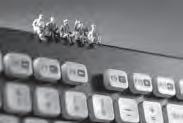

howitworks.com – Internet searches
To use the Internet you need to have a 5wbbr. Then, you can use the touch screen on your phone or the 6kd on your computer to put a word or phrase into a 7sh ee such as Google. If you have 8bd, the information you are trying to find appears very quickly.

Thank you for joining www.english4U2learn.com, the number one website for language learners. We have sent you an email with your 2u e and other login details. Follow the link in the email and choose a 3pd of nine characters or more. And remember, you can use a 4l r pr to print your personal daily wordlist, so you can study any time, anywhere!

Your comments on the topic of teenage communication will328 says:
Most young people do not use their phones for speaking to people. We either look for information on the Internet or we send 9t t m s to family and friends.

WORD STORE 2B | Word building
3 Complete the sentences with the correct form of the words in capitals.
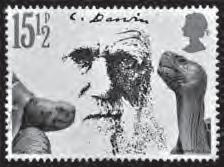
BIOLOGY
1 Galileo Galilei, a famous , was the first person to see the rings of Saturn. He did this using his telescope in 1610. ASTRONOMY
2 The famous Isaac Newton was born on Christmas Day 1642. And it’s not true that an apple hit him on the head. PHYSICS
3 Larry Page, the who helped start the company Google, is now worth $44.5 billion.
COMPUTER SCIENCE
4 The Nobel Prize is named after Alfred Nobel. He was a and he is famous for making dynamite. CHEMISTRY
5 Euclid was a and many people call him the Father of Geometry. He wrote one of the first textbooks for teaching Maths. MATHEMATICS
WORD STORE 2C | Collocations
4 Choose the correct verbs.
1 When you do / make an experiment, it’s not always a success.
2 I prefer collecting / taking specimens. It’s better than working in the laboratory.
3 Was it Marie Curie that invented / discovered radium?
4 The Scottish man, John Logie Baird, invented / discovered television in 1925.
5 Please take / do the important measurements this afternoon, Adam.
6 Famous scientists often develop / observe important theories.
5 Choose the correct answers A–C.
1 I can’t enter the website. Something is wrong.
Am I using the correct ?
A keyboard
B password
C text message
7 Do you prefer taking / doing notes on a computer or a piece of paper?
8 Today we can do / make research on the Internet. In the past it wasn’t so easy.
9 Scientists spend a lot of time just observing / discovering their experiments.
2 I’ve started using a new . I type in what I’m looking for on the Internet and it finds the websites I want really quickly.
A broadband
B username
C search engine
3 Sarah spends a lot of time specimens in the countryside. She truly enjoys being a biologist.
A collecting
B developing
C inventing
4 Kevin wants to be a computer when he is older.
A science
B scientist
C biologist
5 Ben emailed the document to me. I made a copy of it on paper with the for you.
A keyboard
B web browser
C laser printer
6 I’m busy at the moment. I’m notes on this film about astronomy.
A making
B doing
C taking
7 Most people have a Internet connection now because it’s fast.
A web browser
B broadband
C desktop
8 I need a new for my desktop computer. The ‘Enter’ key doesn’t work.
A keyboard
B laptop
C username
9 You must be very creative to something completely new and useful for people to use.
A invent
B discover
C observe
10 James’ father is a(n) . He develops new drugs for people who are sick.
A astronomer
B chemist
C physicist







Continuous and Past Simple
1 Complete the sentences with the Past Simple forms of the verbs in brackets.
1 Graeme awent (go) online this morning and b (buy) tickets for the concert.
2 Simone and Kay a (be) very busy all day yesterday. They b (not/have) time for a break.
3 a (Carly/be) at the Science club last week?
b (she/give) her presentation?
4 a (you/download) those games recently?
b (they/be) free?
2 Complete the dialogue between a policeman and Steve with the Past Continuous forms of the verbs in brackets.
At the police station …
P: What were you doing (do) at six o’clock on the 23rd of October?
S: Erm ... I don’t remember. I think I was at home. Yes, I 1 (watch) TV.
P: Was anyone at home with you?
S: No, nobody. It was just me. I 2 (not/work) that day.
P: I see. So nobody saw you at home at 6 p.m. that day?
S: Oh ... er ... yes of course. Silly me! My wife was there too. She 3 (make) dinner in the kitchen.
P: And what about your children?
S: Oh yeah, the kids! They 4 (do/ homework) upstairs in their bedrooms.
P: And your mother-in-law?
S: Oh yes, of course. Er ... She 5 (stand) in the kitchen.
P: I see. So, can you explain why we have pictures of you waiting in your car outside the bank at 6 p.m.?
3 Complete the sentences with the Past Continuous forms of the verbs in brackets.
Alexander Graham Bell was experimenting (experiment) in his laboratory when he made the first successful telephone call.
4 Choose the correct forms.
1 Sorry, I ahad / was having a shower when you bcalled / were calling.
2 aDid Lola stand / Was Lola standing outside when it bstarted / was starting to rain?
3 When the car acrashed / was crashing into us, we bwaited / were waiting at the traffic lights.
4 Fortunately, we adidn’t ski / weren’t skiing when the bad weather bcame / was coming
1 (Archimedes/have) a bath when he shouted ‘Eureka!’?
2 Mark Zuckerberg (study) at Harvard University when he created Facebook.
3 (Isaac Newton/sit) under an apple tree when he thought of his theory of gravity?
4 Marie Curie (not/live) in Poland when she won her first Nobel Prize in 1903.
5 Complete the story with the Past Simple or Past Continuous forms of the verbs in brackets.
What were you doing (you/do) the last time you 1 (see) something truly amazing? Well, fisherman and journalist Al McGlashan 2 (fish) with friends in his private boat when he 3 (find) something very, very strange. At first the group of fishermen 4 (not/know) what it was, but when they 5 (look) closely, they saw the body of a giant squid – almost 4 metres long! Al got out his video camera and then another amazing thing 6 (happen). He 7 (film) the squid when a large blue shark 8 (arrive) and began eating the dead squid for lunch!
Al 9 (tell) an Australian newspaper that in all his years of fishing he’d never seen anything like it.
6 Find and correct the mistakes. He was clicking on an icon and nothing happened. clicked
1 Tom was downloading music when his computer was getting the virus.
2 Annabelle visited the zoo when she saw an elephant for the first time.
3 Grandma, were you watching television when Apollo 11 was landing on the moon?
4 They were waiting for the bus when it was starting to snow.
5 The girls were playing tennis when Helen was breaking her arm.
6 Was the computers working this morning when you arrived?






Science and scientists
collocations
1 Read the extracts of interviews with two people and choose the correct answers.
1 Speaker A is a child psychologist / a children’s doctor
2 Speaker B is a deep sea diver / a marine biologist
2 Complete the text with the correct verbs from the box. Change the form of the verb if necessary.
analyse collect do (x2) explore protect

Extract from Student’s Book recording 1.32
A: I always want to understand why people do what they do – why do they behave that way? What are they thinking? I’m interested in how we develop from birth to the age of seven. […] I love doing research and 1 data. When I finish my studies, I want to work in a children’s hospital. […]
B: The first time I went scuba diving, I saw a little fish swimming away into the distance, and at that moment I thought ‘Oh yes, that’s what I want to do – I want to 2 oceans, 3 evidence about global warming and help to 4 marine life.’ I love my work – I can’t understand why everybody isn’t 5 my job.
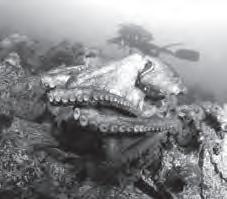

3 Choose the word which does not form a collocation. Use a dictionary if necessary.
1 explore oceans / planets / people / countries
2 analyse chemistry / data / evidence / research
4 Complete the sentences with collocations from Exercise 3.
Even simple things like not throwing rubbish in the sea help to protect marine life.
1 I don’t like beach holidays. I prefer to explore different and to visit places where tourists don’t usually go.
3 do experiments / solutions / research / business
4 collect evidence / signatures / information / science
5 protect marine life / the environment / wildlife / biology
2 The police analysed the but weren’t able to solve the crime.
3 My dad is travelling for work again. His company is doing with a Japanese car company.
4 Emma’s got a summer job with a marketing company doing in a shopping centre. She has to stop shoppers and ask them a few questions.
5 Our class is collecting for a petition against scientific experiments on animals.
6 The government should not build a new road here. We need to protect and the natural environment in this area.
5 Look at the vocabulary in lesson 2.3 in the Student’s Book. Choose a word or phrase from each pair in the box to complete the sentences.
archaeology / an archaeologist conservation / a conservationist geology / a geologist linguistics / a linguist marine biology / a marine biologist psychology / a psychologist
Did you know that a linguist studies how languages work?
1 You must be able to swim if you want to be . You will probably work in the sea a lot of the time.
2 Haley has that she meets. He helps her to talk about her feelings.
3 There’s an interesting course on in the local youth centre. Maybe I can do it and then help people learn more about saving the planet.
4 Rafaele wants to be because he’s always liked looking for old things buried in the ground.
5 I don’t think I’d like – you often examine rocks and stones and get your clothes and hands dirty all the time.
6 Complete the sentences with the missing verb in the correct form. The first letters are given.
Allan analysed the data yesterday and sent me the results this morning.
1 It’s important to c lots of data before making any hypothesis.
2 Next week, Margaret will p her first research paper in a science journal. She’s very excited.
3 Everybody is responsible for helping to p the environment. So turn off the computer when you are not using it!
4 Dr Brown often s hours looking at test results before he finds a problem.





1


1 Read the text quickly and choose the best title.
1 How to create a secure and easy-to-remember password
2 How to remember all your passwords
3 How to guess someone’s password

We all know the basic rules for choosing good passwords and keeping them secret. Rule number one: use numbers, symbols and a good mix of letters – upper case (A, B, C) and lower case (a, b, c). Rule number two: use a different password for each of the devices you use or for each website you visit. Rule number three: change your passwords regularly. Rule number four: never write your passwords down. These rules sound easy to follow, right?
2
Well, not really. The rules say that a securepasswordshouldlooksomething like this: ‘N0r@5%_fpO&47d1nk’. Do you think you can remember that? Don’t forget you should have several different ones, you shouldn’t write them down AND you have to change them every few weeks. Does this sound like an impossible task? Well, for most people, it is. So what do most of us do?
3
Even governments choose terrible passwords. It seems hard to believe, but in the 1980s, the American government actually used the ‘secret code’ ‘00000000’ to unlock its nuclear missiles.
4
So how can we make our passwords secure and memorable*? Well, first, the length of your password is important. For a hacker with a computer that can make 1000 guesses per second, a lower case, 5-letter password like ‘ mps’ takes only around 3hrs and 45 minutes to crack*. A similar password with 20 letters takes a little longer – around 6.5 thousand trillion centuries*!
5
Hackers are very good at guessing whenwechoosesymbolsandnumbers instead of letters. For example, the password ‘M@nch3st3r’ seems like a good one, but the code is actually very simple – first letter = upper case, @ = a, 3 = E. It is easy for
hackers to program their computers to look out for these kinds of codes. Because the length of the password is so important, a group of words written in lower case, e.g. ‘help cheese monkey swimming’ is much more secure than something like ‘M@nch3st3r’, and probably a bit easier to remember (think of a monkey – it is shouting for help and swimming towards some cheese!).
6
One day, we probably won’t have to worry about all this because we won’t need passwords. Some laptop computers already have fingerprint* readers. Recently, scientists in the US have designed a prototype ring for your finger that sends electricity through your skin to a touch screen to tell computers and phones who you are. For now though, we still needpasswords,andifyouwantone that is secure and memorable, the best advice is to make it looooooooo oooooooooooooooooooooooooong. , easy to

Recently, researchers had a chance to analyse secret information about passwords.They found that many of us totally ignore the experts’ advice and choose simple, easy to remember and extremely insecure passwords. Data shows that one out of every ten people uses ‘1234’ as the pin number for their bank cards, and that the passwords ‘welcome’, ‘123456’, ‘ninja’ and of course ‘password’, are some of the most popular choices.

GLOSSARY

memorable (adj) – easy to remember crack a code or a password (v) – work it out or solve it century (n) – 100 years
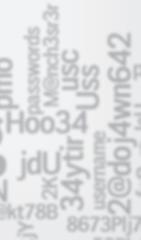


fingerprint (n) – a mark made by the pattern of the skin on the end of your fingers
2Read the text again. Match headings A–H with paragraphs 1–6. There are two extra headings.
A NuM83rs @nd sYmB0ls
B How to become a hacker
C No more passwords!
D Passwords for beginners
E Dangerous choices
F How they did it in the US
G How good is your memory?
H Short = bad, long = good
3 Read the text again. For questions 1–6, choose the correct answer A–D.
1 Which basic rule for passwords is not mentioned?
A Use a mix of letters, numbers and symbols for passwords.
B Use different passwords for different websites.
C Never tell another person your password.
D Change your passwords often.
2 The article says that most people
A don’t know how to choose a secure password.
B use the same password for everything.
C don’t follow experts’ advice when they choose a password.
D forget passwords easily.
3 The most popular password is
A not mentioned.
B ‘password.’
C ‘1234.’
D ‘00000000.’
4 In the 1980s, the US government
A had a secure password for unlocking its nuclear missiles.
B didn’t have a password for unlocking its nuclear missiles.
C lost the password for unlocking its nuclear missiles.
D didn’t have a secure password for unlocking its nuclear missiles.
5 The article says that hackers
A choose passwords with symbols and numbers.
B program their computers to look for symbols and numbers in passwords.
C choose lower case passwords.
D program their computers to look for long passwords.
6 According to the article, scientists in the US recently designed
A fingerprint readers for phones.
B a prototype keyboard.
C something people can wear to identify them.
D a touch screen laptop.
4 Find the opposites underlined in the text.
fantastic ≠ terrible
1 advanced ≠
The weather was terrible at the weekend, but we saw a fantastic film on Saturday. REMEMBER
Many words in English have opposites, e.g. start ≠ finish, easy ≠ difficult, man ≠ woman. These words are called antonyms. When you learn antonyms, use them in personal sentences to help you remember.
In your notebook, write personal sentences with the antonyms from Exercise 4.
2 similar ≠
3 forget ≠
4 possible ≠
5 complicated ≠
and verbs
5 Look at the vocabulary in lesson 2.4 in the Student’s Book. Complete the sentences with the missing verbs or nouns. The first and last letters are given. My grandmother always has a jigsaw on her living room table. I like to help her when I visit, but I often put the pieces in the wrong place.
1 You’ll need to put on another l r of clothing. It’s really cold outside today.
2 My father never takes food to work because he eats at the company’s c n every day.
3 How long will it take to r h the top of the hill? I’m already really tired.
4 Annie wants to r n her own computer games shop when she finishes school.
5 In many towns here you can still see the r s of the old city walls made from large stones.
6 We can’t land on the island. There’s no a p there.
6 Complete the telephone conversation between Warmomatic and a customer with the words from the box. There are two extra words.
above below boiling chilly cold degrees falling freezing rising
In the year 2033 ...
W: Good afternoon. This is Warmomatic. How can I help you?
C: Hello? Warmomatic? Oh, thank goodness you’ve answered. HELP!
W: What is the problem, madam?
C: My computer-controlled heating system isn’t working. My home is really cold! It is 1 zero in every room in the house and the temperature is still 2 . It’s minus ten now.
W: OK madam, please try to calm down. I’ll try to fix the problem from my desktop computer. Please call me again in 20 minutes.
20 minutes later …
W: Good afternoon. This is Warmomatic. How can I help you?
C: It’s me again! Now the house is too hot. In fact, it’s 3 . It’s plus 35 4 centigrade and the temperature is 5 . Help me!
W: Oh dear. There is one very easy solution, madam.
C: Anything. Please. Tell me what to do.
W: Open a window madam. It’s 6 outside.







1 Tick the sentences that describe routines. Choose the time expressions that show regularity. Alastair played computer games every evening before bed. √
1 Karen bought a new laptop last weekend.
2 Patricia and Matt called each other every Friday night.
3 Dean always watched football on Saturday afternoons.
4 Mary dropped her mobile phone down the toilet.
2 When they went to university, two friends, Carl and Owen, moved into a student flat together. Write sentences about them with used to or didn’t use to and the verbs in brackets.
When they lived with their parents ... they didn’t use to eat (eat) unhealthy food. Now they only eat kebabs and pizzas.
1 they (do) any cleaning at home. They still don’t do much and their flat is a mess.
2 their parents (pay) the bills. Now they pay their own bills.
3 Carl (use) his dad’s computer. Now he uses Owen’s.
4 Carl and Owen (argue). Now they argue about the computer.
3 Write positive sentences (+), negative sentences (–) and questions (?) about mobile phones in 1983. Use the correct forms of used to from the box and the words above each line.
did didn’t use to used to use to mobile phones / have cameras (?) Did mobile phones use to have cameras?
1 mobile phones / cost a lot of money (+)
2 most normal people / own a mobile phone (–)
3 people / make fewer phone calls (+)
4 mobile phones / be bigger (?)
4 Tick the correct sentences. Sometimes both sentences are correct.
When I was in the Science club at school, …
1 a we met every Thursday at 4 p.m. √
b we used to meet every Thursday at 4 p.m.
2 a we watched videos about great discoveries.
b we used to watch videos about great discoveries.
3 a one week, a physicist came to speak to us.
b one week, a physicist used to come to speak to us.
4 a our group went on a trip to the Science Museum in London.
b our group used to go on a trip to the Science Museum in London.
5 a my friend Emma once gave a talk about the sun.
b my friend Emma once used to give a talk about the sun.
5 Complete the dialogue between Jodie and her dad with the correct forms of used to and the verbs in brackets.
J: Dad, did you use to own (you/own) a smartphone when you were my age?
D: Did I what?
J: 1 (you/use) a smartphone or a laptop when you were a teenager?
D: What?! No I didn’t. I was 14 in … er … wait a minute … in 1981. We 2 (have) laptops back then.
J: So, how 3 (check) your messages?
D: Jodie?! There were no messages or texts; no Facebook or anything. We 4 (send) letters or faxes.
J: I see. Wow … Dad, what’s a fax?
D: Er … well … it was a bit like a photocopier. You 5 (write) your message on a piece of paper, then put it in the fax machine …
J: And then?
D: Well, then you 6 (dial) the number and wait. The machine er … well … it read the piece of paper and sent it to your friend.
J: What, the piece of paper?
D: What? No! Not the same piece of paper, Jodie –just the message.
J: I see. Wow. /6
GRAMMAR: Train and Try Again page 145
5 mobile phones / have touch screens (–)
6 mobile phones / send text messages (?) 1983 today






1 Choose the correct words.
1 I read the biography of Martin Luther King during / while I was at home sick.
2 They didn’t have smartphones when / by my father was a student.
3 As soon as / While we downloaded the song, we listened to it six times.
4 I learned a lot about web browsers during / while the weekend computer course.
5 It was minus ten every day last week until / by Friday.
2 Complete the second sentence so it has a similar meaning to the first. Use between two and five words, including the word in capitals. You can take my laptop now but I need it on Wednesday. BY You can take my laptop now but return it by Wednesday, please.
1 The moment you get home, send me a text message. SOON Send me a text message home.
2 Susie drove to Manchester and listened to the CD in the car WHEN Susie listened to the CD to Manchester.
3 I was watching the film and began to feel cold. DURING I the film.
4 We had something to eat and waited for the program to download. WHILE We had something to eat downloading.
5 James did the experiment then showed me his notes. AFTER James showed me the experiment.
6 I read my book and waited for you to arrive. UNTIL I your arrival.
3 Choose the correct answers A–C.
4 Complete the sentences with one word in each gap. Use each word only once.
Dad: Jono, I don’t want you to use my laptop while I’m washing the car. Wait until I finish, OK?
Jono: Yes, Dad. I promise.
1 Tess: Let’s play a game the flight toMadrid.
Bill: Good idea. How about Scrabble?
2 Matt: I had to speak to my Physics teacher. Why didn’t you wait the end of our conversation?
Vic: I didn’t know where you were or who you were with. Sorry.
3 Al: I decided to take a year off I went to university to study Chemistry.
Gina: Really? What did you do for a year?
4 Phil: I stopped downloading the game as as I realised it was illegal software.
Chris: Good idea. Why don’t we try a different game?
5 Ella: I need to finish this report tomorrow morning. Can we meet in the afternoon?
Jon: No problem. I’ll send you a text message.
5 Complete the sentences with the words in brackets in the correct form. Do not change the order of the words. You may need to add words. Use no more than six words in each gap.
I listened to the song before I knew (the song / before / know) who sang it.
1 Adrian sent the text message (while / drive), which is dangerous.
2 I (not fall / asleep / during) the Biology class. I was just resting my eyes.
3 (after / I / speak / Mandy) I decided not to lend her my smartphone.
4 The children all (go / sleep / by / midnight) on the school trip last week.
5 Yesterday, I called my mum (while / travel) home on the bus.

Stephen Hawking was one of the most famous scientists in the world. He was born in Oxford in 1942 and lived there 1 the moment he moved to Cambridge to complete his PhD. 2 this, however, people already knew that he was intelligent. He enjoyed Maths and Science at school very much. He found both subjects very easy, and it was 3 he was studying there that his friends began to call him ‘Einstein’, for fun. Stephen’s first university was actually Oxford, where he studied Physics and Chemistry. 4 his studies there, at the age of 21, he became very sick and had problems speaking and moving. 5 he realised he was extremely ill, he decided to work harder. This was because he really wanted to finish his PhD 6 he died.
Hawking finished his PhD when he was only 24. Later he wrote over 15 very popular science books. His doctors didn’t expect him to live long. He died at the age of 76 – definitely too early, as many say.
1A till B by C while 2A After B Before C Until 3A during B while C as soon as


4A During B While C As soon as 5A Till B While C When 6A before B by C for







1 Read the tips for writing a story. Tick the useful advice.
1 Set the scene by introducing who is in the story and where they are. ✓
2 Include at least three main characters.
3 Use different past tenses and structures in the story.
4 Use adjectives, adverbs and phrases to make the story interesting.
5 Use linkers and time expressions to show the order of events.
6 Try not to repeat the same words.
7 Write a happy ending.
8 Write four paragraphs.
2 Matchsuitable parts of useful phrases for writing a story. There are two extra endings. It was four years i
1 What a
2 I’ll never
3 It was a few
4 It was a lovely day
5 What
6 Meeting my husband was
a years later when …
b in trouble
c a surprise!
d nightmare!
e forget …
f going on?
g for a walk …
h an event I’ll never forget.
i ago when …– Are you brave enough to wat
3 Read the story Hitting the Jackpot below. Complete gaps 1–3 with a suitable phrase from Exercise 2.
4 Read the story again. Choose the correct words.
5 Read the story Lost in New York below. Cross out one incorrect word in each underlined sentence a–g. Then write the correct word.
6 Complete the story with the correct form of the verbs in brackets.



when
I was 14 years old while I got lost in New York. I was (be) on a school trip and on the last day we went to a museum before our flight home. We 1 (travel) by city bus when I 2 (begin) to feel sleepy.
aAll of the sudden,someone 3 (start) shaking me. I was the only person left on the bus.
bWhat wasgoing up? I slowly realised I was lost.
cI have to saying I was scared. I 4 (not/have) any money and my phone was dying.
dI was by trouble.
While I 5 (think) what to do, I 6 (see) a woman. She was wearing a pilot’s uniform.
eLucky, she helped me. fShe was incredible kind and told me how to get to the airport and even gave me ten dollars for the ticket.
When I finally 7 (get) on the plane, the pilot 8 (make) an announcement. I recognised her voice immediately. It was the woman from the bus. She 9 (invite) me to the front of the plane and 10 (explain) how everything worked. gI’ll always forget the day I travelled with the pilot.
*

It was four years ago when my luck started to change. I was walking home from work when a man rushed out of a newsagent’s and jumped on a bus. aUnfortunately / Incredibly, a small piece of paper fell from his pocket.
It was a lottery ticket. I put it in my bag and forgot all about it until a few weeks later when I found it again in my handbag. I checked the ticket. 1 It wasn’t the winning ticket, but it won a small amount of money.
bAnyhow / I mustadmit I thought about taking the money, but I decided to keep the ticket for good luck instead.
c Actually / While, my luck did change after that.
2 I met my husband, Paul. On our wedding day, he said he felt like the luckiest man alive. At that moment, I decided to tell him the story of my lottery ticket to show him I was lucky too. dThen / Unfortunately Paul started to laugh. 3 the next thing he told me. He used to play the lottery and the numbers on the ticket were his lucky numbers. eDuring / Suddenly I knew who he was. It was Paul who dropped the ticket. I couldn’t believe it! We weren’t rich, but we were very happy fanyway / luckily
* Hit the Jackpot – to be very successful or lucky

7 Read the task below. Then complete gaps 1–7 in the story with the phrases from the box. There is one extra phrase.
Your school is holding a competition for the best short story about a surprising event. Write a story. Include and develop these points:
• Give information to set the scene.
• Describe what happened on that day using different past tenses and structures.
• Use different words and phrases to show the order of events and add interest.
• Give your story a strong ending.
didn’t use to care didn’t use to smile used to have used to laugh used to see didn’t use to take used to tell used to walk
I was 17 years old awhen / while I moved to my village. Every day I 1 the same way home from school and every day I 2 an old man. He bwas / were sitting quietly under the same tree. He always looked miserable and children 3 at him.
During the next few weeks I cstarted / was starting to say hello when I saw him under the tree and later we actually became good friends. I 4 him about the exams I was taking at school and he told me all about the job he 5 as a conservationist. I dhave / must admit I 6 about the environment, but thanks to him, I started to think about it more carefully. Anyway, one day he wasn’t there. And he wasn’t there the next day. What ewas going / went on? I went to his house to look for him. Unfortunately, I found out he died the day before.
Then, a few weeks later when I fwasn’t / was walking home from school, a young woman came and gave me a letter. It was from the old man’s wife. He told her about our conversations and that he felt cheerful when he was talking to me. He decided that he gwas wanting / wanted to give me a gift.
He hgave / was giving me his special bracelet. He 7 it off. Now I do the same. The old man is a friend I’ll never forget.
8 Read the story again. Choose the correct words a–h.
9 Look at the story in Exercise 7 again and find examples for some of the tips in Exercise 1.
Tip 3 3 examples of the Past Continuous:
Tip 4 2 adjectives to describe the old man:
10 You see a short story competition in your favourite magazine and decide to enter. Write a story with the title ‘A day to remember’. Include and develop these points:
• Give information to set the scene.
• Describe what happened on that day using different tenses and structures.
2 adverbs: 1 phrase:
Tip 5 4 linkers and time expressions showing the order of events:
• Use different words and phrases to show the order of events and add interest.
• Give your story a strong ending.
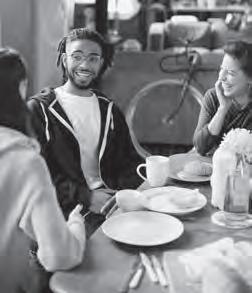
SHOW THAT YOU’VE CHECKED
Finished? Always check your writing. Can you tick √ everything on this list?
In my story:
• I have given information to set the scene, e.g. I was ten years old …, It was a cold dark evening
• I have used the Past Simple and Continuous, and perhaps used to to describe what happened, e.g. It started to rain as I was climbing the mountain.
• I have used different words and phrases to make my story interesting for the reader, e.g. What was going on? It was awesome!
• I have included adverbs to add interest, e.g. Suddenly, Luckily, incredibly.
• I have given my story a strong ending, e.g. I’ll never forget when I first went …, … was an event I’ll never forget.
• l have checked my spelling and punctuation.
• My text is neat and clear.







1 Translate the phrases into your own language.
SPEAKING BANK
Telling a story
Use the right tenses
• Past Continuous is used to describe the background for the main events:
The sun was shining and I was enjoying myself.
• Past Simple is used to describe a problem and the main events.
The weather changed. I couldn’t see the path.
Use linkers
• Beginning: To start with/ At first
• Middle: Suddenly/All of a sudden/Luckily/Fortunately/ Unfortunately
• End: In the end/Eventually/ Finally
Say how you felt
I was excited/frightened/ relieved/surprised/shocked/ worried.
Make a ‘final comment’
It was the best/worst day of my life!
I’ll never forget the look on his face!
I’ll never do it again.
Listening to a story
Neutral response
Really?/Oh dear./Oh no.
Strong response
That sounds amazing/funny/ frightening.
2 Complete the dialogue between Felix and Eva with the words from the box. There are two extra items.
except for excited happened Luckily Next time nightmare relieved shocked sounds Suddenly to start with
F: We had a fantastic time on our summer holiday –except for the day we went to the island.
E: What 1 ?
What a great story/a nightmare!
Respond with questions
What happened?
What did you do?
F: We were travelling on a fast boat to visit a beautiful little island. The captain of the boat was going very fast and the waves were really big. 2 , the boat hit a giant wave.
E: Oh no!
F: There was a loud bang, the front window broke and lots and lots of water rushed in.
E: Wow! That 3 really frightening.
F: Yeah, well, we were 4 because it happened so quickly and the water hit us really hard. 5 , nobody was seriously hurt.
E: What did you do?
F: Well, in the end we got to the island – wet but very 6 to be back on dry land.
E: What a 7 !
F: 8 , we’ll take the slow boat.
3 Complete each gap with one word.
Conversation 1: Alice and Cindy
A: Yesterday I dreamt about meeting someone famous.
C: Really? Who?
A: Well, I was sitting in Manchester Airport, waiting for a flight to Warsaw. I remember, I was reading Little Women at the time. Suddenly, the lady next to me said ‘Excuse me, 1 you enjoying that book?’
C: Who was it?
A: Well, I looked at her and I thought, ’I know you‘, and then I realised it was Louisa May Alcott.
C: What? The author of the book you 2 reading? That’s amazing! What did you say?
A: Well, to start 3 I didn’t know what to say, but fortunately, she was really friendly. 4 the end, we chatted for about ten minutes and I told her how much I love her books.
Conversation 2: Andrew and Nancy
A: I’m afraid 1 horses.
N: What? Why?
A: Well, when I was twelve years old, my neighbour took me riding on her horse.
N: 2 happened?
A: It was my first time on a horse. 3 first, everything was OK. We 4 going very slowly. My neighbour was holding the horse and I was sitting 5 its back. I was enjoying the ride, but then all 6 a sudden, there was a loud noise and the horse got scared and started running ... really fast!
N: That sounds really frightening.
A: It was. Luckily, I didn’t fall off. I stay away from horses these days.


1 In pairs, ask and answer the questions.
PART 1
Talk about personalities.
1 What is your best friend like?
2 Are you generous or mean? Why?
3 What qualities would you like to have? Why?
4 What is a good travelling companion like? Why?
5 Do you think students should wear school uniforms? Why?/Why not?
2 Look at the pictures that show different types of scientists.
PART 1
PART 2
Talk about technology.
1 What do you mostly use your smartphone for? Why?
2 How do you feel in a place with no wifi? Why?
3 Would you prefer to give up your smartphone for a week or your laptop for a month? Why?
4 Have you ever had a problem with technology? What happened and how did you feel?
5 What is bad about living in the technological age?
Which of these jobs do you think is the most interesting? Discuss in pairs.



PART 2
In pairs, ask and answer the questions.
1 Have you ever watched the night sky like an astronomer?
2 Would you prefer to be a physicist, biologist or chemist? Why?
3 Do you like Mathematics? Why?/Why not?
4 What things can conservationists do to help our planet?


5 How do you think archaeologists feel when they find something important? Why?
6 Do you like studying Science? Why?/Why not?
7 Which of these jobs do you think is the best for you? Why?
3 Discuss this question together. ’Do you think scientists do a more important job than artists?’ Why?/Why not?
For scientists:
Scientists …
• find ways to make us feel better when we are sick.
• discover ways we can communicate with each other.
• help us to understand the world.
• find ways to help us travel.
For artists:
Artists …
• create culture in society.
• help us to understand ourselves.
• create things that touch our emotions.
• bring colour to our world.


VOCABULARY AND GRAMMAR
1 Complete the sentences with the words from the box in the correct form. There are two extra words. jigsaw keyboard laser printer layer password search engine specimen username For more information, check online using a search engine
1 We need another two of paint on the wall. I can still see the graffiti.
2 This new is excellent. Look at the high quality of these pictures.
3 Luther is in the garden collecting for our project on plants.
4 I can’t find the last piece of the Maybe it’s under the sofa.
5 Did you know that the most used in the world is ‘123456’?
2 Complete the sentences with the correct words. The first letters are given.
Sir Isaac Newton is probably the most famous physicist in the world.
1 My favourite subject is C because I love working in the lab.
2 Patrick is very good with numbers. Does he want to study M at university?
3 C s make a lot of money. And with robots becoming more popular, they will earn more in the future.
4 I know I’m a plant biologist, but it’s ten degrees c outside. Let’s stay in the lab today, OK?
5 In January 1971, experts observed temperatures of 80 degrees b zero. Now THAT is cold!
/5
3 Use the beginnings from the box to make words and complete the sentences.
archaeo- astro- conserva- geo- lingui- psychoTheodore Roosevelt was an early conservationist. He protected over 150 million acres of American forests for public use.
1 Many people say that John Aubrey (1626–1697) invented when he studied Stonehenge in England.
2 Philip Zimbardo is a contemporary American . His ‘prison experiment’ showed how people behave in extreme conditions.
4 Choose the correct verb forms. Peter didn’t go / wasn’t going to school on Thursday.
1 Adam adid / was doing his homework when Simon bcalled / was calling
2 We aslept / were sleeping when the postman brang / was ringing the doorbell.
3 aWere they finding / Did they find the pharmacy before it bclosed / was closing?
3 Did you know that don’t only work with materials on Earth? Some of them work with rocks from the moon and other planets.
4 In 1610, Galileo discovered the four largest moons of Jupiter using a telescope. For this reason, people call him the father of .
5 You don’t have to speak a foreign language to be a good , but it probably helps.
/5
4 Chloe and Kyle adanced / were dancing together when the music bstopped / was stopping
5 aDid Shelly wait / Was Shelly waiting at the station when the train bcrashed / was crashing?
5 Find and correct the mistakes.
Did Auntie Kay used to cook a big meal on Sundays? use
1 Beth used to go to Hong Kong for the first time in 2009.
2 Teenagers didn’t used to have mobile phones in the 1980s.
3 Josh used to invent a popular video game.
4 Did use to be milk free at school when you were little?
5 When Grandpa was young, films used to were black and white.
6 Choose the correct answers A–C.
C are small, light personal computers for mobile use. They have most of the same components as 1 computers including a screen, speakers and a 2 to write/type with. In the 1970s, IBM 3 the first company to make and sell these mobile computers. At first, laptops didn’t 4 to have batteries and the screens were black and white and very small. Later, in the 1990s, colour screens 5 more popular. Nowadays, laptops are more popular than any other type of computer.
/5

A Desktops B Websites C Laptops
1A broadband B desktop C Internet
2A keyboard B password C web browser
3A was B used to be C used to 4A use B used C have
5A were becoming B used to become C became
/5
Total /30
7 Choose the correct answers A–C.
Phil: My father in a chemistry laboratory in Chicago last summer
Vic: Cool. Did you visit him when he was there?
A used to work
B were working
C worked
1 Amy: Why didn’t you answer the phone?
Tony: Sorry, I measurements of the room.
Amy: Ah, OK.
A took
B was taking
C ‘m taking
2 Fiona: When I lived in Florence I often went to the Leonardo da Vinci Museum.
Cathy: Really? I didn’t know in Florence.
Fiona: Yes. I lived there for six years.
A you were living
B you used to live
C were you living
3 Dad: Sara!
Sara: Sorry. I just wanted to check something.
A Not to use my smartphone.
B You don’t use my smartphone.
C Don’t use my smartphone.
4 Pete: I had a great time the visit to the Natural History Museum
Jim: I’m not surprised. It’s amazing!
A during
B while C as soon as
5 Mark: Georgiana waited for me I finished analysing data and then we had lunch.
Connie: That was kind of her.
A when B until C soon /5
8 Complete the sentences with the words in brackets in the correct form. Do not change the order of the words. You may need to add words. Use no more than six words in each gap.
The American physicist James Russell didn’t invent the CD (not / invent / the CD) in 1964, but in 1965.
1 Professor Phillips was (plan / publish / research paper) when he suddenly became ill.
2 I (not / use / like) computer games but then I discovered Minecraft.
9 Complete the text with the correct forms of the words from the box. There are two extra words.
In 2008, a farmer was walking with his animals through the Caucasus Mountains in Georgia. He used 1 this often, but on this day he saw the unusual 2 of an old stone structure. The farmer decided to explore the area. Inside the structure were two human skeletons. They 3 on chairs in front of a table. What was so interesting? The bodies were extremely large.
He contacted a team of archaeologists. On the way there, they saw some very large statues and what seemed to be a large stone road through the forest. The scientists 4 evidence (i.e. some of the bones) and took it to Tbilisi, the capital city of Georgia. They asked Professor Vikua, famous for discovering Homo Erectus Georgicus, to help them, but he died before he could do any research. When the scientists looked for the bones that Professor Vikua had, they could not find them.
In 2014, the Science Channel opened a new investigation, but they haven’t found any new evidence or 5 a theory to explain these mysterious giant bones.
collect develop do follow protect remain sit walk /5
10 Choose the correct answers A–C.
Are we in danger from visitors from other planets? Are the astronauts that we B into space making life on this planet dangerous?
Last week while I 1 a science magazine, I found this interesting article. NASA, it said, were looking for someone to help them 2 experiments on the organisms that astronauts regularly collect during their trips into space. The job is to 3 notes on what you observe during these tests, and then work with other scientists looking closely at the data. Your research may help protect Earth against a future alien invasion. But, NASA hopes, one day the results of your work might help them to 4 new life on other planets. They might also help mankind 5 parts of the universe where no man or woman has ever visited before. What a great job!
3 He sent me the file (soon / it / download) so that I could check it.
4 James (use / work) for Microsoft. He thinks it is a good company.
5 Where (you / go) when I saw you in the tram last night? /5

A sent B send C did send
1A did read B read C was reading 2A make B do C take 3A take B have C do
4A collect B invent C discover 5A get B reach C go
/5
Total /20